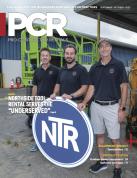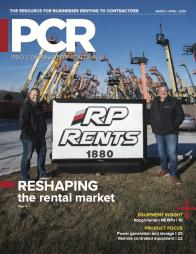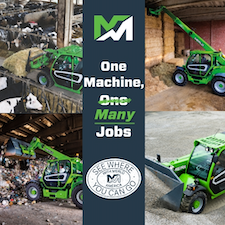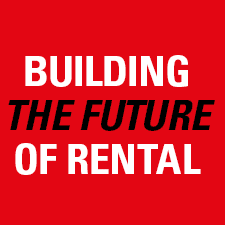Real-time tools for asset management in the palm of your hand
Why going mobile is the smartest move equipment rental companies can make.
by Alexander Sarian
 |
| The tools rental teams already carry, like smartphones and tablets, become powerful extensions of a rental center’s core systems. Suddenly, service jobs are scheduled proactively and inspections are shared instantly. Everyone sees the same, up-to-date information wherever they are. |
In the equipment rental industry, uptime is everything. When a machine isn’t where it should be or it’s there but out of action your customers get frustrated, job sites grind to a halt, and costs escalate fast.
Yet despite the high stakes, many rental businesses are still relying on paper-based systems, disjointed spreadsheets, and reactive service models to manage increasingly complex operations.
It’s not because of a lack of skill or work ethic; rental professionals are smart, experienced operators. What’s missing is access to the real-time tools that allow them to operate with the speed, coordination and visibility that today’s environment demands and that’s where mobile technologies can change everything.
The hidden cost of delays
Equipment downtime is rarely caused by a single catastrophic failure. More often, it’s the result of smaller inefficiencies that stack up: a missed service window, a delayed inspection report, a technician dispatched without the right part.
The root cause is usually a lack of timely information. Field teams wait on paperwork. Head office dispatchers juggle manual handoffs. The data needed to make decisions sits in silos or worse, in someone’s head.
When businesses go mobile, they flip that situation. The tools rental teams already carry, like smartphones and tablets, become powerful extensions of a rental center’s core systems. Suddenly, service jobs are scheduled proactively and inspections are shared instantly. Everyone sees the same, up-to-date information wherever they are.
Mobile isn’t just a convenience; it’s an efficiency engine
The best digital tools don’t just digitize existing workflows, they actively improve them. In the equipment rental industry, the biggest gains come when mobile technologies become embedded into daily operations.
Consider equipment inspections. Before mobile apps, inspection reports often lived on paper forms that had to be physically returned, rekeyed, and filed. That delay could stretch from hours into days, meanwhile, damage might go unreported or a machine might be rented out in poor shape.
With mobile technologies, inspections are completed on the spot using digital checklists, photos, videos and signatures. The data is instantly available to fleet managers and service teams. Turnaround times improve, risk goes down and asset performance climbs.
The same applies to field service. With mobile access to job schedules, asset histories, timesheets and parts availability, technicians can work smarter and in a far more efficient manner. They arrive prepared, close out jobs on-site, and log work details in real time. No back-and-forth with the office, no delays in invoicing, faster response times and fewer repeat visits.
Connecting the dots across the business
From a systems perspective, the power of mobile comes from integration. When mobile tools feed directly into ERP, CRM and service platforms, it creates a closed loop of data. That means a fault code triggered by telematics can automatically generate a work order, a completed service call can trigger an invoice and a signed delivery confirmation can update availability in the rental calendar.
This isn’t just about automating tasks. It’s about creating a single version of the truth across the rental business, so decisions are made with confidence and execution follows without delay.
After implementing mobile solutions tied to their rental ERP, rental centers gain real-time utilization dashboards that assist in everything from procurement to pricing strategy. That shift from lagging data to live intelligence can unlock a true competitive advantage.
Logistics and delivery, reimagined
Mobile systems also bring game-changing improvements to logistics. Coordinating deliveries and pickups has traditionally involved phone calls, whiteboards, hand-written notes and a healthy dose of luck.
With mobile apps, drivers receive live job assignments and routing. They can capture proof of delivery, log delays, upload photos and collect digital signatures all from the cab of their truck. Back-office staff see the status of every job without needing to make a call while customers get accurate ETAs and delivery confirmations in real time. It’s a win across the board with faster dispatch, fewer disputes, and better customer service.
Customers expect more and mobile helps deliver more
Outside of work, rental customers are already using mobile technologies to manage every aspect of their lives. They increasingly expect the same level of control and transparency when working with equipment rental providers.
Customer portals accessed via mobile let clients check equipment availability, view live delivery updates, request pickups and raise service issues all without needing to call or email. It’s faster for them and less work and effort for your team.
For companies looking to differentiate on customer experience, mobile becomes a powerful value-added proposition. Rental centers are not just providing machines, they’re providing access, insight and control.
Empowering the workforce, not replacing it
There’s a common misconception that mobile tools are about replacing people with software. However, the opposite is true.
The best implementations don’t remove human expertise; they simply support it. They give field staff and yard teams the tools to act faster and more independently. They reduce the administrative burden so people can focus on doing the work that matters.
Technicians who are initially hesitant become champions of mobile once they realize it saved them trips to the depot and helped them complete more jobs per day. Delivery teams can reduce turnaround times by hours just by digitizing their dispatch process. With thoughtful rollout and support, adoption is rarely the barrier it’s made out to be.
Addressing the common concerns
Naturally, some businesses hesitate before making the leap. Concerns range from connectivity in remote areas to the perceived complexity of integrating new systems, but today’s mobile platforms are designed with these challenges in mind.
Offline functionality ensures that data is captured even without a live signal and syncs when connectivity resumes. Integration apps have become more flexible, allowing new tools to plug into existing systems with minimal disruption. Mobile user interfaces have matured to the point where even less tech-savvy users can pick them up quickly with minimal training.
The reality is, the technology has caught up. The only question is whether businesses are ready to catch up with it.
What’s next for mobile in rental
The future of mobile technologies in the rental industry is already taking shape. AI-driven maintenance recommendations, based on patterns picked up across large fleets, are emerging. Augmented reality could begin to assist field technicians with step-by-step repairs. Voice interfaces are making it even easier to log work while hands are full.
All of this will be delivered through mobile. The phone or tablet will remain the central control hub for equipment management by connecting people, machines and systems in real time. Businesses that invest now will not only operate more efficiently today, they’ll be positioned to adopt tomorrow’s innovations with ease.
Mobile technology accelerates decision-making, improves asset utilization, empowers employees and enhances customer relationships. It breaks down silos and replaces slow and manual processes with intelligent, connected workflows. It does what every rental business wants to do: move faster, serve better and grow sustainably.
The industry is evolving and expectations are rising. It’s no longer enough to run a tight ship, rental centers must run a smart one. Going mobile has gone beyond being a nice-to-have to being the next competitive edge for equipment rental businesses.
To learn more, visit www.baseplan.com and get in touch with the team.
Alexander Sarian is director of sales & marketing at Baseplan Software Group. A key differentiator for Baseplan is its deep understanding of the rental industry’s unique challenges. The software is developed with input from industry experts and customers, resulting in a system that aligns with real-world workflows and supports rapid decision-making. With a strong focus on innovation, Baseplan continues to invest in mobile technologies, real-time reporting, telematics integration,and other innovative technologies assisting customers to stay competitive in a rapidly evolving market.













